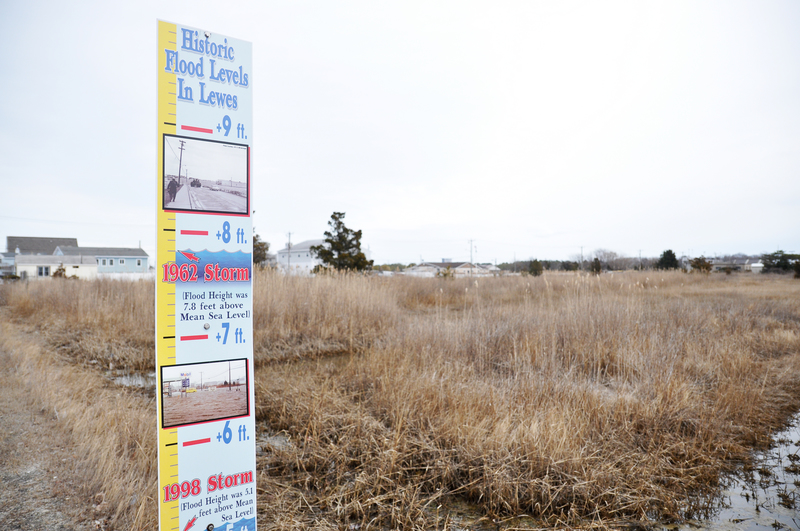The infamous Storm of '62 may have been a once-in-a-lifetime storm, but Lewes officials aren't counting their chickens before they hatch. If another big storm hits, whether in 50 years or later this year, they want to be ready.
“We are going to have flooding. It's not a matter of if, it's when,” said Darrin Gordon, general manager of the Lewes Board of Public Works. “It's coming. It's going to happen.”
A flood awareness and preparedness workshop was held March 6 at the College of Marine Studies. Cpl. Chatham Marsch of the Lewes Police Department and Gordon each described how their department and employees would handle a storm event while also sharing tips for residents. Also offering information was Wendy Carey of Delaware Sea Grant, who works on education and outreach programs with communities and individuals as well as state and federal agencies and groups.
Flooding is likely the most common hazard in Delaware, she said, and Lewes is a very proactive in planning for future storm events.
“Lewes is setting a really good standard for other communities as they move forward in incorporating natural hazards and climate change into their comprehensive plans,” she said.
Water rose nearly 9.5 feet above normal during the Storm of '62, the highest ever recorded in Lewes. Like most dangerous nor'easters, that storm stalled off the coast, pummeling the Cape Region for three days and five consecutive high tides. Historical photographs show much of Lewes east of the canal under water.
Sea level rise is also a concern for future flooding, Carey said. Records show the sea is rising at an average of one foot per century, meaning since 1962 the sea has likely risen half a foot. Sea level rise can impact the natural environment, wetlands and agricultural fields and cause erosion of shorelines, she said.
Lewes officials were mindful of the past when building new infrastructure, Gordon said. Its new wastewater treatment facility, built six years ago, was constructed to endure 9.5 feet of flooding.
Elsewhere in the city, Gordon said, specific precautions are taken to avoid major problems with the electrical system when a storm is bearing down on Lewes. They may result in outages, but the measures will prevent bigger issues, he said.
As far as storm water management, he said, the city is doing everything it can to make sure water is drained as quickly as possible. But even the best storm water system cannot prevent flooding.
“We can do nothing to stop the flooding,” Gordon said. “We clean out the ditches, and we keep the pipes clean and all that does is it expedites getting the water out once the water goes down in the canal. [Flooding] is still going to happen. ”
Gordon and Marsch attended a hurricane conference in New Orleans, La. last year, where they learned more about preparedness and strategies before, during and after a hurricane or major storm event.
“The city of Lewes is in very good shape compared to some of these people in New Jersey and New York,” Marsch said.
Lewes joined the National Flood Insurance Program in 1977 and the Community Rating System 22 years ago, said Deputy Mayor Ted Becker during the meeting's opening remarks. The CRS is a voluntary incentive program that recognizes communities for implementing floodplain management practices that exceed the federal minimum requirements. Policy holders who live within a participating municipality could see reduced insurance premiums. Becker said efforts are ongoing to increased the city's rating.
“That's something we've been working on for a long time,” he said. “There are still opportunities for us to do better.”
The late Mayor George Smith established the hazard mitigation team in 2002, which meets quarterly to discuss preparedness and awareness of future hazards, such as hurricanes.
Savannah Road, New Road, Kings Highway and Freeman Highway are the city's established evacuation routes. The problem is, Marsch said, those routes tend to flood. To ensure everyone gets out safely, he said, residents should be aware of when the storm will hit and when emergency officials say to evacuate.
By not following the directions of emergency officials, Marsch said, people not only put themselves at risk, but also the first responders who will need to risk their safety to save those folks.
Before evacuating, he said, residents should prepare their homes by secure outside items, moving valuables to the second floors. For those sticking around for the storm, Gordon had a myriad of tips, such as securing enough water to last several days and preparing to lose electricity. His ultimate tip, though, was to prepare for the worst. If residents are ready for the worst, then they should be able to handle the storm.
To determine if you live in a high risk flooding area, Carey recommends checking the Federal Emergency Management Agency's website, msc.fema.gov. Flood insurance information can be found at www.floodsmart.gov.
Nick Roth is the news editor. He has been with the Cape Gazette since 2012, previously covering town beats in Milton and Lewes. In addition to serving on the editorial board and handling page layout, Nick is responsible for the weekly Delaware History in Photographs feature and enjoys writing stories about the Cape Region’s history. Prior to the Cape Gazette, Nick worked for the Delmarva Media Group, including the Delaware Wave, Delaware Coast Press and Salisbury Daily Times. He also contributed to The News Journal. Originally from Boyertown, Pa., Nick attended Shippensburg University in central Pennsylvania, graduating in 2007 with a bachelor’s degree in journalism. He’s won several MDDC awards during his career for both writing and photography. In his free time, he enjoys golfing, going to the beach with his family and cheering for Philadelphia sports teams.






















































